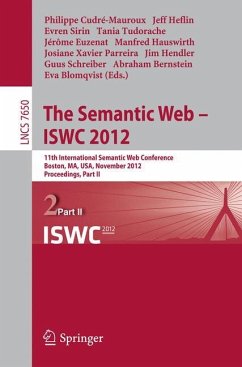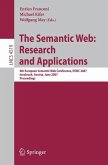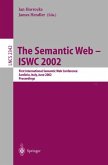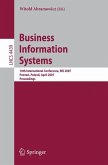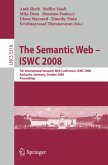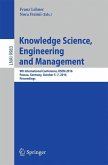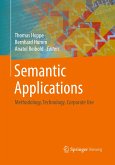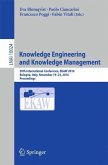The Semantic Web -- ISWC 2012
11th International Semantic Web Conference, Boston, MA, USA, November 11-15, 2012, Proceedings, Part II
Herausgegeben:Cudré-Mauroux, Philippe; Heflin, Jeff; Sirin, Evren; Tudorache, Tania; Euzenat, Jerome; Hauswirth, Manfred; Parreira, Josiane Xavier; Hendler, Jim; Schreiber, Guus; Bernstein, Abraham; Blom
The Semantic Web -- ISWC 2012
11th International Semantic Web Conference, Boston, MA, USA, November 11-15, 2012, Proceedings, Part II
Herausgegeben:Cudré-Mauroux, Philippe; Heflin, Jeff; Sirin, Evren; Tudorache, Tania; Euzenat, Jerome; Hauswirth, Manfred; Parreira, Josiane Xavier; Hendler, Jim; Schreiber, Guus; Bernstein, Abraham; Blom
- Broschiertes Buch
- Merkliste
- Auf die Merkliste
- Bewerten Bewerten
- Teilen
- Produkt teilen
- Produkterinnerung
- Produkterinnerung
The two-volume set LNCS 7649 + 7650 constitutes the refereed proceedings of the 11th International Semantic Web Conference, ISWC 2012, held in Boston, MA, USA, in November 2012. The International Semantic Web Conference is the premier forum for Semantic Web research, where cutting edge scientific results and technological innovations are presented, where problems and solutions are discussed, and where the future of this vision is being developed. It brings together specialists in fields such as artificial intelligence, databases, social networks, distributed computing, Web engineering,…mehr
Andere Kunden interessierten sich auch für
![The Semantic Web: Research and Applications The Semantic Web: Research and Applications]() Enrico Franconi / Michael Kifer / Wolfgang May (eds.)The Semantic Web: Research and Applications75,99 €
Enrico Franconi / Michael Kifer / Wolfgang May (eds.)The Semantic Web: Research and Applications75,99 €![The Semantic Web - ISWC 2002 The Semantic Web - ISWC 2002]() Ian Horrocks / James Hendler (eds.)The Semantic Web - ISWC 200242,99 €
Ian Horrocks / James Hendler (eds.)The Semantic Web - ISWC 200242,99 €![Business Information Systems Business Information Systems]() Witold Abramowicz (ed.)Business Information Systems74,99 €
Witold Abramowicz (ed.)Business Information Systems74,99 €![The Semantic Web - ISWC 2008 The Semantic Web - ISWC 2008]() The Semantic Web - ISWC 200875,99 €
The Semantic Web - ISWC 200875,99 €![Knowledge Science, Engineering and Management Knowledge Science, Engineering and Management]() Knowledge Science, Engineering and Management38,99 €
Knowledge Science, Engineering and Management38,99 €![Semantic Applications Semantic Applications]() Semantic Applications33,99 €
Semantic Applications33,99 €![Knowledge Engineering and Knowledge Management Knowledge Engineering and Knowledge Management]() Knowledge Engineering and Knowledge Management75,99 €
Knowledge Engineering and Knowledge Management75,99 €-
-
-
The two-volume set LNCS 7649 + 7650 constitutes the refereed proceedings of the 11th International Semantic Web Conference, ISWC 2012, held in Boston, MA, USA, in November 2012. The International Semantic Web Conference is the premier forum for Semantic Web research, where cutting edge scientific results and technological innovations are presented, where problems and solutions are discussed, and where the future of this vision is being developed. It brings together specialists in fields such as artificial intelligence, databases, social networks, distributed computing, Web engineering, information systems, human-computer interaction, natural language processing, and the social sciences. Volume 1 contains a total of 41 papers which were presented in the research track. They were carefully reviewed and selected from 186 submissions. Volume 2 contains 17 papers from the in-use track which were accepted from 77 submissions. In addition, it presents 8 contributions to the evaluations and experiments track and 7 long papers and 8 short papers of the doctoral consortium.
Produktdetails
- Produktdetails
- Lecture Notes in Computer Science 7650
- Verlag: Springer / Springer Berlin Heidelberg / Springer, Berlin
- Artikelnr. des Verlages: 978-3-642-35172-3
- 2012
- Seitenzahl: 500
- Erscheinungstermin: 30. Oktober 2012
- Englisch
- Abmessung: 235mm x 155mm x 27mm
- Gewicht: 751g
- ISBN-13: 9783642351723
- ISBN-10: 3642351727
- Artikelnr.: 36679989
- Herstellerkennzeichnung Die Herstellerinformationen sind derzeit nicht verfügbar.
- Lecture Notes in Computer Science 7650
- Verlag: Springer / Springer Berlin Heidelberg / Springer, Berlin
- Artikelnr. des Verlages: 978-3-642-35172-3
- 2012
- Seitenzahl: 500
- Erscheinungstermin: 30. Oktober 2012
- Englisch
- Abmessung: 235mm x 155mm x 27mm
- Gewicht: 751g
- ISBN-13: 9783642351723
- ISBN-10: 3642351727
- Artikelnr.: 36679989
- Herstellerkennzeichnung Die Herstellerinformationen sind derzeit nicht verfügbar.
Research Track.- MORe: Modular Combination of OWL Reasoners for Ontology Classification.- A Formal Semantics for Weighted Ontology.- Personalised Graph-Based Selection of Web APIs.- Instance-Based Matching of Large Ontologies Using Locality-Sensitive Hashing.- Automatic Typing of DBpedia Entities.- Performance Heterogeneity and Approximate Reasoning in Description Logic Ontologies.- Concept-Based Semantic Difference in Expressive Description Logics.- SPLODGE: Systematic Generation of SPARQL Benchmark Queries for Linked Open Data.- RDFS Reasoning on Massively Parallel Hardware.- An Efficient Bit Vector Approach to Semantics-Based Machine Perception in Resource-Constrained Devices.- Semantic Enrichment by Non-experts: Usability of Manual Annotation Tools.- Ontology-Based Access to Probabilistic Data with OWL QL.- Predicting Reasoning Performance Using Ontology Metrics.-Formal Verification of Data Provenance Records.- Cost Based Query Ordering over OWL Ontologies.- Robust Runtime Optimization and Skew-Resistant Execution of Analytical SPARQL Queries on Pig.- Large-Scale Learning of Relation-Extraction Rules with Distant Supervision from the Web.- The Not-So-Easy Task of Computing Class Subsumptions in OWL RL.- Strabon: A Semantic Geospatial DBMS.- DeFacto - Deep Fact Validation.- Feature LDA: A Supervised Topic Model for Automatic Detection of Web API Documentations from the Web.- Efficient Execution of Top-K SPARQL Queries.- Collaborative Filtering by Analyzing Dynamic User Interests Modeled by Taxonomy.- Link Discovery with Guaranteed Reduction Ratio in Affine Spaces with Minkowski Measures.- Hitting the Sweetspot: Economic Rewriting of Knowledge Bases.- Mining Semantic Relations between Research Areas.- Discovering Concept Coverings in Ontologies of Linked Data Sources.- Ontology Constraints in Incomplete and Complete Data.- A Machine Learning Approach for Instance Matching Based on Similarity Metrics.- Who Will Follow Whom? Exploiting Semantics for Link Predictionin Attention-Information Networks.- On the Diversity and Availability of Temporal Information in Linked Open Data.- Semantic Sentiment Analysis of Twitter.- CrowdMap: Crowdsourcing Ontology Alignment with Microtasks.- Domain-Aware Ontology Matching.- Rapidly Integrating Services into the Linked Data Cloud.- An Evidence-Based Verification Approach to Extract Entities and Relations for Knowledge Base Population.- Blank Node Matching and RDF/S Comparison Functions.- Hybrid SPARQL Queries: Fresh vs. Fast Results.- Provenance for SPARQL Queries.- SRBench: A Streaming RDF/SPARQL Benchmark.- Scalable Geo-thematic Query Answering.- In-Use Track.- Managing the Life-Cycle of Linked Data with the LOD2 Stack.- Achieving Interoperability through Semantics-Based Technologies: The Instant Messaging Case.- Linking Smart Cities Datasets with Human Computation - The Case of UrbanMatch.- ourSpaces - Design and Deployment of a Semantic Virtual Research Environment.- Embedded EL+ Reasoning on Programmable Logic Controllers.- Experiences with Modeling Composite Phenotypes in the SKELETOME Project.- Toward an Ecosystem of LOD in the Field: LOD Content Generation and Its Consuming Service.- Applying Semantic Web Technologies for Diagnosing Road TrafficCongestions.- deqa: Deep Web Extraction for Question Answering.- QuerioCity: A Linked Data Platform for Urban Information Management.- Semantic Similarity-Driven Decision Support in the Skeletal Dysplasia Domain.- Using SPARQL to Query BioPortal Ontologies and Metadata.- Trentino Government Linked Open Geo-data: A Case Study.- Semantic Reasoning in Context-Aware Assistive Environments to Support Ageing with Dementia.- Query Driven Hypothesis Generation for Answering Queries over NLP Graphs.- A Comparison of Hard Filters and Soft Evidence for Answer Typing in Watson.- Incorporating Semantic Knowledge into Dynamic Data Processing for Smart Power Grids.- Evaluations and Experiments Track.- Evaluating Semantic Search Query Approaches withExpert and Casual Users.- Extracting Justifications from BioPortal Ontologies.- Linked Stream Data Processing Engines: Facts and Figures.- Benchmarking Federated SPARQL Query Engines: Are ExistingTestbeds Enough?.- Tag Recommendation for Large-Scale Ontology-Based Information Systems.- Evaluation of Techniques for Inconsistency Handling in OWL 2 QL Ontologies.- Evaluating Entity Summarization Using a Game-Based Ground Truth.- Evaluation of a Layered Approach to Question Answering over Linked Data.- Doctoral Consortium - Long Papers.- Cross Lingual Semantic Search by Improving Semantic Similarity and Relatedness Measures.- Quality Reasoning in the Semantic Web.- Burst the Filter Bubble: Using Semantic Web to Enable Serendipity.- Reconstructing Provenance.- Very Large Scale OWL Reasoning through Distributed Computation.- Replication for Linked Data.- Scalable and Domain-Independent Entity Coreference: Establishing High Quality Data Linkages across Heterogeneous Data Sources.- Doctoral Consortium - Short Papers.- Distributed Reasoning on Semantic Data Streams.- Reusing XML Schemas' Information as a Foundation for Designing Domain Ontologies.- A Multi-domain Framework for Community Building Based on Data Tagging.- Towards a Theoretical Foundation for the Harmonization of Linked Data.- Knowledge Pattern Extraction and Their Usage in Exploratory Search.- SPARQL Update for Complex Event Processing.- Online Unsupervised Coreference Resolution for Semi-structured Heterogeneous Data.- Composition of Linked Data-Based RESTful Services.
Research Track.- MORe: Modular Combination of OWL Reasoners for Ontology Classification.- A Formal Semantics for Weighted Ontology.- Personalised Graph-Based Selection of Web APIs.- Instance-Based Matching of Large Ontologies Using Locality-Sensitive Hashing.- Automatic Typing of DBpedia Entities.- Performance Heterogeneity and Approximate Reasoning in Description Logic Ontologies.- Concept-Based Semantic Difference in Expressive Description Logics.- SPLODGE: Systematic Generation of SPARQL Benchmark Queries for Linked Open Data.- RDFS Reasoning on Massively Parallel Hardware.- An Efficient Bit Vector Approach to Semantics-Based Machine Perception in Resource-Constrained Devices.- Semantic Enrichment by Non-experts: Usability of Manual Annotation Tools.- Ontology-Based Access to Probabilistic Data with OWL QL.- Predicting Reasoning Performance Using Ontology Metrics.-Formal Verification of Data Provenance Records.- Cost Based Query Ordering over OWL Ontologies.- Robust Runtime Optimization and Skew-Resistant Execution of Analytical SPARQL Queries on Pig.- Large-Scale Learning of Relation-Extraction Rules with Distant Supervision from the Web.- The Not-So-Easy Task of Computing Class Subsumptions in OWL RL.- Strabon: A Semantic Geospatial DBMS.- DeFacto - Deep Fact Validation.- Feature LDA: A Supervised Topic Model for Automatic Detection of Web API Documentations from the Web.- Efficient Execution of Top-K SPARQL Queries.- Collaborative Filtering by Analyzing Dynamic User Interests Modeled by Taxonomy.- Link Discovery with Guaranteed Reduction Ratio in Affine Spaces with Minkowski Measures.- Hitting the Sweetspot: Economic Rewriting of Knowledge Bases.- Mining Semantic Relations between Research Areas.- Discovering Concept Coverings in Ontologies of Linked Data Sources.- Ontology Constraints in Incomplete and Complete Data.- A Machine Learning Approach for Instance Matching Based on Similarity Metrics.- Who Will Follow Whom? Exploiting Semantics for Link Predictionin Attention-Information Networks.- On the Diversity and Availability of Temporal Information in Linked Open Data.- Semantic Sentiment Analysis of Twitter.- CrowdMap: Crowdsourcing Ontology Alignment with Microtasks.- Domain-Aware Ontology Matching.- Rapidly Integrating Services into the Linked Data Cloud.- An Evidence-Based Verification Approach to Extract Entities and Relations for Knowledge Base Population.- Blank Node Matching and RDF/S Comparison Functions.- Hybrid SPARQL Queries: Fresh vs. Fast Results.- Provenance for SPARQL Queries.- SRBench: A Streaming RDF/SPARQL Benchmark.- Scalable Geo-thematic Query Answering.- In-Use Track.- Managing the Life-Cycle of Linked Data with the LOD2 Stack.- Achieving Interoperability through Semantics-Based Technologies: The Instant Messaging Case.- Linking Smart Cities Datasets with Human Computation - The Case of UrbanMatch.- ourSpaces - Design and Deployment of a Semantic Virtual Research Environment.- Embedded EL+ Reasoning on Programmable Logic Controllers.- Experiences with Modeling Composite Phenotypes in the SKELETOME Project.- Toward an Ecosystem of LOD in the Field: LOD Content Generation and Its Consuming Service.- Applying Semantic Web Technologies for Diagnosing Road TrafficCongestions.- deqa: Deep Web Extraction for Question Answering.- QuerioCity: A Linked Data Platform for Urban Information Management.- Semantic Similarity-Driven Decision Support in the Skeletal Dysplasia Domain.- Using SPARQL to Query BioPortal Ontologies and Metadata.- Trentino Government Linked Open Geo-data: A Case Study.- Semantic Reasoning in Context-Aware Assistive Environments to Support Ageing with Dementia.- Query Driven Hypothesis Generation for Answering Queries over NLP Graphs.- A Comparison of Hard Filters and Soft Evidence for Answer Typing in Watson.- Incorporating Semantic Knowledge into Dynamic Data Processing for Smart Power Grids.- Evaluations and Experiments Track.- Evaluating Semantic Search Query Approaches withExpert and Casual Users.- Extracting Justifications from BioPortal Ontologies.- Linked Stream Data Processing Engines: Facts and Figures.- Benchmarking Federated SPARQL Query Engines: Are ExistingTestbeds Enough?.- Tag Recommendation for Large-Scale Ontology-Based Information Systems.- Evaluation of Techniques for Inconsistency Handling in OWL 2 QL Ontologies.- Evaluating Entity Summarization Using a Game-Based Ground Truth.- Evaluation of a Layered Approach to Question Answering over Linked Data.- Doctoral Consortium - Long Papers.- Cross Lingual Semantic Search by Improving Semantic Similarity and Relatedness Measures.- Quality Reasoning in the Semantic Web.- Burst the Filter Bubble: Using Semantic Web to Enable Serendipity.- Reconstructing Provenance.- Very Large Scale OWL Reasoning through Distributed Computation.- Replication for Linked Data.- Scalable and Domain-Independent Entity Coreference: Establishing High Quality Data Linkages across Heterogeneous Data Sources.- Doctoral Consortium - Short Papers.- Distributed Reasoning on Semantic Data Streams.- Reusing XML Schemas' Information as a Foundation for Designing Domain Ontologies.- A Multi-domain Framework for Community Building Based on Data Tagging.- Towards a Theoretical Foundation for the Harmonization of Linked Data.- Knowledge Pattern Extraction and Their Usage in Exploratory Search.- SPARQL Update for Complex Event Processing.- Online Unsupervised Coreference Resolution for Semi-structured Heterogeneous Data.- Composition of Linked Data-Based RESTful Services.

